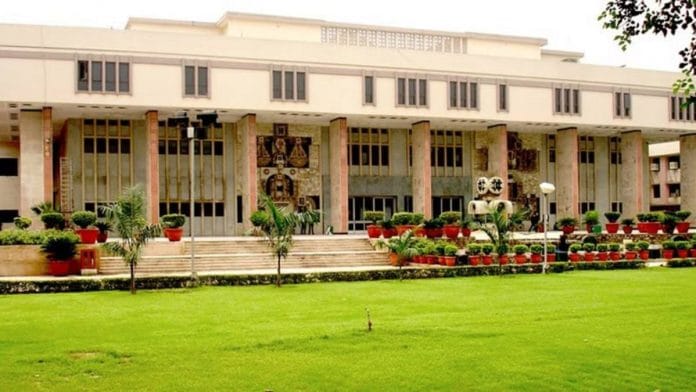New Delhi: The Delhi High Court Thursday asked the central government to respond to a petition challenging a government notification that doesn’t allow women to change their surname back to their maiden surname without a divorce or a no-objection certificate (NOC) from the husband.
The notice was issued by a bench comprising Acting Chief Justice Manmohan and Justice Manmeet Pritam Singh Arora. The government has to file its response by 28 May when the matter will be heard next.
The petition has been filed by a Delhi-based woman aged 40 years. The woman legally took her husband’s surname in September 2014. The change was officially documented and published in The Gazette of India as well. In 2019, she again changed her name to include both her maiden name and her husband’s surname in her name.
However, an undated notification issued by the Department of Publication, Union Ministry of Housing and Urban Affairs, was then issued, specifically for “obtaining maiden surname”.
This notification states that if a married woman wants to get her maiden surname back, she will have to submit a copy of a decree of divorce or an NOC from her husband. It also says that if the matter is in court, the change of name cannot be processed till the final verdict is pronounced.
In August last year, the petitioner filed a divorce petition under the Hindu Marriage Act, 1955, before a Delhi court. She is currently pursuing the divorce proceedings, and wants to now revert to her maiden name for all social, educational, economic and other purposes.
As the petitioner navigates the complexities of her situation, it raises broader questions about the implications of name changes in personal identity and societal norms. The struggle for women to reclaim their maiden names often intersects with cultural expectations and legal hurdles.
The petitioner has told the court that “in view of the irretrievable breakdown of marriage”, she now wishes to change her name and adopt her maiden surname. However, owing to the “arbitrary nature” of the government notification, she is unable to do so.
The woman challenged the notification in the Delhi High Court on 27 February, demanding a direction for quashing it.
She has submitted that the notification is “patently discriminatory, arbitrary, unreasonable, and violates the petitioner’s fundamental rights under Articles 14 (equality before law), 19 (right to freedoms, including freedom of speech and expression), and 21 (right to life and personal liberty) of the Constitution of India”.
She asserts that the notification “displays evident gender bias and constitutes a form of impermissible discrimination by imposing additional and disproportionate requisites exclusively on women”.
By subjecting women to more burdensome conditions compared to men seeking a change in name, the notification unjustly discriminates against them, the petition alleges.
The petition also says that the notification “unreasonably curtails the freedom of expression and personal identity, particularly of women, by mandating to provide a no-objection certificate from the husband or a copy of a divorce decree”.
(Edited by Nida Fatima Siddiqui)






